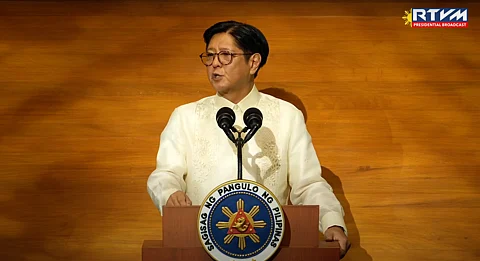
- NEWS
- the EDIT
- COMMENTARY
- BUSINESS
- LIFE
- SHOW
- ACTION
- GLOBAL GOALS
- SNAPS
- DYARYO TIRADA
- MORE

Globe Telecom has reiterated its commitment to supporting President Ferdinand Marcos Jr.'s call for inclusive development in Geographically Isolated and Disadvantaged Areas, or GIDAs, a priority outlined in his recent State of the Nation Address.
In his speech, Marcos spoke of the persistent challenges facing remote communities, which often lack internet access, reliable electricity, and essential public services.
He noted that roughly 12,000 public schools remain without internet access and that while free Wi-Fi sites have grown to nearly 19,000 nationwide, more work is needed.
The President also stressed the importance of strengthening the National Fiber Backbone initiative to provide genuine access to those in the country's most remote corners.
"We share the president's vision to create a future where every Filipino can participate in the digital economy," said Globe president and CEO Carl Cruz. "We've seen firsthand how critical it is to connect even the most remote communities. It’s not just about putting up cell sites. It’s about giving people a fair shot at education, health care, safety and livelihood."
The Philippines recently climbed four spots in the 2025 Connectivity Index, as reported by The Economist Intelligence Unit.
This improvement reflects the telecom sector's ongoing efforts to expand internet availability and affordability. Internet service prices continue to fall on a cost-per-gigabyte basis, and access is growing thanks to continuous infrastructure builds.
Despite this progress, the country continues to face challenges with access, particularly in remote areas. With many communities still unconnected, the goal of providing internet for every Filipino remains a work in progress.
"Clearly there are still gaps that we need to address," Cruz said. "User density per site needs to improve so that quality of service will also improve."
Globe highlighted its collaboration with the government on the Bayanihan SIM initiative as a key solution to bridging the digital divide.
"This is one area where government assistance is put to bear," Cruz said. "By working together, we're able to get connectivity tools directly into the hands of those who need them most, especially in public schools and disadvantaged communities."
The initiative, a partnership with the Department of Information and Communications Technology, provides SIM cards preloaded with 25 gigabytes of free monthly data. With the entire telecom industry onboard, the program aims to benefit 1 million people nationwide.
Globe’s pilot rollout of the program took place at Kalawakan Elementary School in Doña Remedios Trinidad, Bulacan, a GIDA community where students, teachers and parents received free SIMs with ready-to-use data.
This effort complements Globe's broader infrastructure push to reach more GIDAs.
In 2024, Globe deployed 51 solar-powered cell sites in off-grid areas, bringing mobile service to previously disconnected communities. These sites support daily learning, communication and access to public services.
To accelerate its rollout in GIDAs, Globe works closely with local governments to streamline permitting.
The company also partners with the Department of Information and Communications Technology to activate free public Wi-Fi in libraries and schools in underserved municipalities.
Beyond connectivity, Globe has distributed LTE pocket Wi-Fi devices, SIMs with free data and Globe At Home Prepaid Wi-Fi kits to schools with limited access to digital tools. Its KonekTayo Wi-Fi service also provides affordable, load-based internet to low-income households in remote communities.
These initiatives align with government goals to modernize education, strengthen disaster preparedness, expand e-governance and promote digital inclusion. Globe continues to advocate for building reforms that support long-term connectivity, such as including dedicated telecom rooms in new buildings, a one-canal policy and easing business regulations.
Globe remains committed to being a partner in nation-building, working with the government and communities to ensure access to digital services is a basic right for every Filipino.
